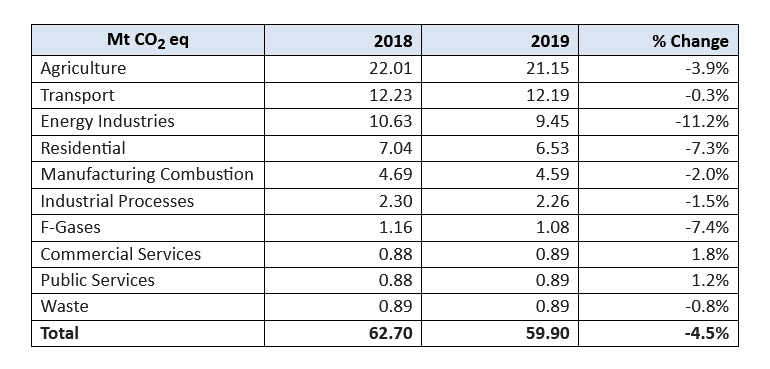- Ireland’s greenhouse gas emissions decreased by 4.5% in 2019. This is the largest annual reduction in emissions since 2011.
- Despite the decrease, Ireland is still not on the pathway required to meet future targets and a climate neutral economy.
- Energy Industries emissions decreased by 11% with a significant decrease in coal (69%) and peat (8%) used.
- Agriculture emissions decreased by 3.9%, driven by reduced fertiliser use and lime use on soils.
- Residential emissions reduced by 7.3 %, largely the result of a warmer winter.
- Greenhouse gas emissions from the transport sector reduced only marginally despite an increase in biofuel use.
Full details on Greenhouse Gas Emission Inventory 1990 to 2019 are available on the EPA website HERE and the EPA Greenhouse Gas web resource HERE.

The Environmental Protection Agency (EPA), as the competent authority for reporting Ireland’s greenhouse gas emissions, has yesterday published its provisional greenhouse gas emissions for Ireland for 2019. The figures show a reduction of 4.5% compared to 2018, which is the largest decrease since 2011. Significant emission reductions are recorded for the Energy Industries, Agriculture and Residential sectors. These decreases come despite modest growth in the domestic economy of 1.7% over the year.
However, the figures indicate that Ireland will exceed its 2019 annual EU emissions allocation by 6.98Mt which makes it highly unlikely that Ireland will meet its overall 2020 targets, even taking the impact of Covid 19 on emissions in 2020 into account.
Commenting on the figures Laura Burke, (Director General, EPA) has stated:
“This much needed reduction in greenhouse gas emissions is a welcome step in the right direction. The figures show that emissions reductions can be achieved and in 2019 there have been reductions in power generation, agriculture and residential sectors. However, if the 2020s are to be the decade of climate action, this level of emission reductions, at a minimum, will be required annually. Therefore, these reductions need to be built on to achieve continual, substantial, year-on-year emissions reductions. It will take the implementation of effective measures, including all those committed to in the Climate Action Plan, to put Ireland on the pathway to a climate neutral future”.
The emission reductions have been driven by a number of factors across the sectors including:
Energy Industries: Emissions in the Energy Industries sector showed a decrease of 11.2% (1.19 Mt CO2eq) in 2019, which is attributable to a 69% decrease in coal and an 8% decrease in peat used in electricity generation. Electricity generated from wind increased by 16.0% in 2019, with renewables accounting for 37.6% of electricity generated. After 2020, a continued increase in renewable generation levels will be required to meet ambitious future greenhouse gas targets.
Agriculture: Agriculture emissions decreased by 3.9% (0.86 Mt CO2eq) in 2019. This was driven by reduced fertiliser use (down 10.1%) and a reduction in the quantity of lime used on soils (down 25.4%), which had both increased substantially the previous year. Other key drivers of emissions in agriculture, such as the number of dairy cows, continued to rise.
Residential: Emissions in the Residential sector decreased by 7.3% (0.52 Mt of CO2eq) in 2019 with the warmer winter resulting in decreased use of fuels. However, emissions per household have plateaued in recent years which indicates a need to step up energy efficiency retrofit activity to achieve future emission reduction commitments.
Transport: Greenhouse gas emissions from the Transport sector decreased slightly, by 0.3% (0.04 Mt CO2eq), in 2019. An increased demand for transport largely offset more biofuel use which was up 21.9% in 2019. Reducing transport emissions requires a blend of measures such as more cycling and walking as well as new technologies such as electric vehicles and biofuels.
Commenting, Stephen Treacy, (Senior Manager, EPA) has stated:
“These 2019 figures illustrate where our economy and emissions were heading before the COVID-19 pandemic. While, 2020 is likely to see a reduction in emissions caused by the impact of the pandemic, this does not negate the need for long term and sustained action. Focusing on climate action as part of a ‘green’ recovery offers the opportunity to respond to climate change while rebuilding our economy and generating new jobs.”

Leave a Reply